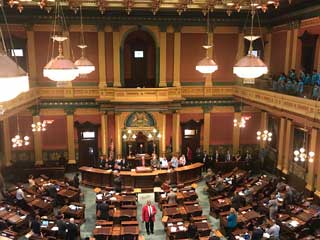The Word from Lansing: Promoting the Common Good—A Look Back

Posted July 14, 2017
Throughout his papacy, Pope Francis has emphasized the needs of the vulnerable, urging people of faith to care for the marginalized and forgotten. Leading by example, the Holy Father has hosted refugee families at the Vatican, opened a medical clinic for the homeless, and recognized the dignity of all persons, including those who struggle with addiction or are serving time in prison. Pope Francis has set a tone of mercy, calling for people of faith to promote genuine interaction and service to others in their community.
In June, the Catholic bishops in Michigan and additional members of the Michigan Catholic Conference (MCC) Board of Directors brought the Holy Father’s witness to the State Capitol. Over lunch and within conversations, leadership of the MCC met with state lawmakers on both sides of the political aisle to engage in open dialogue and build on issues of common concern. Guided by the leadership of Most Reverend Allen H. Vigneron, Archbishop of Detroit and chairman of the MCC Board of Directors, the Catholic Church in this state is following the example set by Pope Francis to speak for the marginalized and those on the periphery.
Two weeks after the luncheon was held, lawmakers passed the 2017–2018 State of Michigan budget and returned to their home districts for the summer. This break presents the opportunity to highlight here the passage of several MCC-supported measures in the first half of the 2017–2018 legislative session.
Early in the year, lawmakers approved a package of criminal justice reform bills. These measures encourage genuine rehabilitation to make communities safer. The legislation provides specialty programming to help rehabilitate young prisoners and encourages the implementation of evidence-based supervision practices that reduce recidivism. The bills also expand participation in the "Swift and Sure" Probation Supervision Program, an intensive program for high-risk felony offenders with a history of probation violations or failures.
Another area of legislative success has been the fight against human trafficking, or modern-day slavery. Pope Francis has urged those in government to combat the crime, “giving voice to our younger brothers and sisters who have been wounded.” Lawmakers this year passed laws that allow victims to “defer and dismiss” prostitution-related offenses they were forced to commit while being trafficked and that allow expert witness testimony on the behavioral patterns of victims to count as evidence at trial. Both measures account for the impact of the trauma on victims, recognizing these individuals need support and understanding, not criminal charges and public shaming. While continued efforts are needed to address trafficking, the measures helped to change the conversation.
The formulation of the state budget has created beneficial policies for Michiganders. Lawmakers continue to fund the Michigan Parenting and Pregnancy Support program, a policy that supports women in crisis pregnancies and promotes alternatives to abortion. The budget also provides energy assistance through the state, which draws down more federal food assistance for low-income families; funding to help struggling Michiganders purchase clothing for their children; and appropriations to help shelter and transition the homeless into permanent living.
For the second year, Michigan’s budget provides $2.5 million to assist nonpublic schools in meeting state health, safety, and welfare requirements and ensuring all children are kept safe, regardless of where they attend school. Finally, for the first time, the state budget provides $300,000 in competitive grants for nonpublic schools to enhance their students’ participation in robotics and Science Olympiad competitions. Governor Snyder will soon consider the budget proposal passed by lawmakers to determine which items will be included in the final law.
Other important issues, including protecting children against threats such as female genital mutilation, providing for the state’s behavioral health needs, and addressing the opioid crisis, have received significant attention thus far in 2017. The Catholic Church has been a presence in these and other conversations about the common good, drawing attention to the needs of the most vulnerable in society.
A year and a half remains in the current legislative session. More bills will be introduced, discussed, and enacted, impacting millions of Michiganders. Michigan Catholic Conference, on behalf of the Catholic bishops in this state, looks forward to continuing to advocate for the protection of human dignity and those most in need. To learn more, visit www.micatholic.org/can/.
